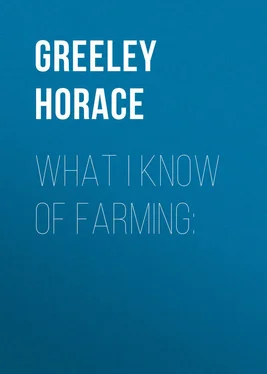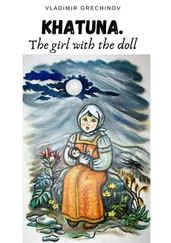Horace Greeley - What I know of farming:
Здесь есть возможность читать онлайн «Horace Greeley - What I know of farming:» — ознакомительный отрывок электронной книги совершенно бесплатно, а после прочтения отрывка купить полную версию. В некоторых случаях можно слушать аудио, скачать через торрент в формате fb2 и присутствует краткое содержание. Жанр: foreign_antique, foreign_prose, foreign_language, на английском языке. Описание произведения, (предисловие) а так же отзывы посетителей доступны на портале библиотеки ЛибКат.
- Название:What I know of farming:
- Автор:
- Жанр:
- Год:неизвестен
- ISBN:нет данных
- Рейтинг книги:4 / 5. Голосов: 1
-
Избранное:Добавить в избранное
- Отзывы:
-
Ваша оценка:
- 80
- 1
- 2
- 3
- 4
- 5
What I know of farming:: краткое содержание, описание и аннотация
Предлагаем к чтению аннотацию, описание, краткое содержание или предисловие (зависит от того, что написал сам автор книги «What I know of farming:»). Если вы не нашли необходимую информацию о книге — напишите в комментариях, мы постараемся отыскать её.
What I know of farming: — читать онлайн ознакомительный отрывок
Ниже представлен текст книги, разбитый по страницам. Система сохранения места последней прочитанной страницы, позволяет с удобством читать онлайн бесплатно книгу «What I know of farming:», без необходимости каждый раз заново искать на чём Вы остановились. Поставьте закладку, и сможете в любой момент перейти на страницу, на которой закончили чтение.
Интервал:
Закладка:
To every young man who has had no farming experience, or very little, yet who means to make farming his vocation, I say, Hire out, for the coming year, to the very best farmer who will give you anything like the value of your labor. Buy a very few choice books, (if you have them not already,) which treat of Geology, Chemistry, Botany, and the application of their truths in Practical Agriculture; give to these the close and thoughtful attention of your few leisure hours; keep your eyes wide open, and set down in a note-book or pocket-diary each night a minute of whatever has been done on the farm that day, making a note of each storm, shower, frost, hail, etc., and also of the date at which each planted crop requires tillage or is ripe enough to harvest, and ascertaining, so far as possible, what each crop produced on the farm has cost, and which of them all are produced at a profit and which at a loss. At the year's end, hire again to the same or another good farmer and pursue the same course; and so do till you shall be twenty-four or twenty-five years of age, which is young enough to marry, and quite young enough to undertake the management of a farm. By this time, if you have carefully saved and wisely invested your earnings, you will have several hundred dollars; and, if you do not choose to migrate to some region where land is very cheap, you will have found some one willing to sell you a small farm on credit, taking a long mortgage as security. Your money – assuming that you have only what you will have earned – will all be wanted to fix up your building, buy a team and cow, with the few implements needed, and supply you with provisions till you can grow some. If you can start thus experienced and full-handed, you may, by diligence, combined with good fortune, begin to make payments on your mortgage at the close of your second year.
I hate debt as profoundly as any one can, but I do not consider this really running into debt. One has more land than he needs, and does not need his pay for it forthwith; another wants land, but lacks the means of present payment. They two enter into an agreement mutually advantageous, whereby the poorer has the present use and ultimate fee-simple of the farm in question, in consideration of the payment of certain sums as duly stipulated. Technically, the buyer becomes a debtor; practically, I do not regard him as such, until payments fall due which he is unable promptly to meet. Let him rigorously avoid all other debt, and he need not shrink from nor be ashamed of this.
I have a high regard for scientific attainments; I wish every young man were thoroughly instructed in the sciences which underlie the art of farming. But all the learning on earth, though it may powerfully help to make a good farmer, would not of itself make one. When a young man has learned all that seminaries and lectures, books and cabinets, can teach him, he still needs practice and experience to make him a good farmer.
– "But wouldn't you have a young man study in order that he may become a good farmer?"
– If he has money, Yes. I believe a youth worth four or five thousand dollars may wisely spend a tenth of his means in attending lectures, and even courses of study, at any good seminary where Natural Science is taught and applied to Agriculture. But life is short at best; and he who has no means, or very little, cannot really afford to attend even an Agricultural College. He can acquire so much of Science as is indispensable in the cheaper way I have indicated. He cannot wisely consent to spend the best years of his life in getting ready to live.
He who has already mastered the art of farming, and has adequate means, may of course buy a farm to-morrow, though he be barely or not quite of age. He has little to learn from me. Yet I think even such have often concluded, in after years, that they were too hasty in buying land – that they might profitably have waited, and deliberated, and garnered the treasures of experience, before they took the grave step of buying their future home; with regard to which I shall make some suggestions in my next chapter.
But I protest against a young man's declining or postponing the purchase of a farm merely because he is not able to buy a great one. Twenty acres of arable soil near a city or manufacturing village, forty acres in a rural district of any old State, or eighty acres in a region just beginning to be peopled by White men, is an ample area for any one who is worth less than $2,000. If he understands his business, he will find profitable employment hereon for every working hour: if he does not understand farming, he will buy his experience dear enough on this, yet more cheaply than he would on a wider area. Until he shall have more money than he needs, let him beware of buying more land than he absolutely wants.
V.
BUYING A FARM
No one need be told at this day that good land is cheaper than poor – that the former may be bought at less cost than it can be made. Yet this, like most truths, may be given undue emphasis. It should be considered in the light of the less obvious truth that Every farmer may make advantageous use of SOME poor land . The smallest farm should have its strip or belt of forest; the larger should have an abundance and variety of trees; and sterile, stony land grows many if not most trees thriftily: Even at the risk of arousing Western prejudice, I maintain that New-England, and all broken, hilly, rocky countries, have a decided advantage (abundantly counterbalanced, no doubt) over regions of great fertility and nearly uniform facility, in that human stupidity and mole-eyed greed can never wholly divest them of forests – that their sterile crags and steep acclivities must mainly be left to wood forever. Avarice may strip them of their covering of to-day; but, defying the plow and the spade, they cannot be so denuded that they will not be speedily reclothed with trees and foliage.
I am not a believer that "Five Acres" or "Ten Acres" suffice for a farm. I know where money is made on even fewer than five acres; but they who do it are few, and men of exceptional capacity and diligence. Their achievements are necessarily confined to the vicinage of cities or manufacturing villages. The great majority of all who live by Agriculture want room to turn upon – want to grow grass and keep stock – and, for such, no mere garden or potato-patch will answer. They want genuine farms.
Yet, go where you may in this country, you will hear a farmer saying of his neighbor, "He has too much land," even where the criticism might justly be reciprocated. We cannot all be mistaken on this head.
There are men who can each manage thousands of acres of tillage, just as there are those who can skillfully wield an army of a hundred thousand men. Napoleon said there were two of this class in the Europe of his day. There are others who cannot handle a hundred acres so that nothing is lost through neglect or oversight. Rules must be adapted to average capacities and circumstances. He who expects to live by cattle-rearing needs many more acres than he who is intent on grain-growing; while he who contemplates vegetable, root, and fruit culture, needs fewer acres still. As to the direction of his efforts, each one will be a law unto himself.
If I were asked, by a young man intent on farming, to indicate the proper area for him, I would say, Buy just so large a farm as half your means will pay for . In other words, "If you are worth $20,000, invest half of it in land, the residue in stock, tools, etc.; and observe the same rule of proportion, whether you be worth $1,000,000 or only $1,000. If you are worth just nothing at all, I would invest in land the half of that, and no more. In other words, I would either wait to earn $500 or over, or push Westward till I found land that costs practically nothing."
Читать дальшеИнтервал:
Закладка:
Похожие книги на «What I know of farming:»
Представляем Вашему вниманию похожие книги на «What I know of farming:» списком для выбора. Мы отобрали схожую по названию и смыслу литературу в надежде предоставить читателям больше вариантов отыскать новые, интересные, ещё непрочитанные произведения.
Обсуждение, отзывы о книге «What I know of farming:» и просто собственные мнения читателей. Оставьте ваши комментарии, напишите, что Вы думаете о произведении, его смысле или главных героях. Укажите что конкретно понравилось, а что нет, и почему Вы так считаете.












